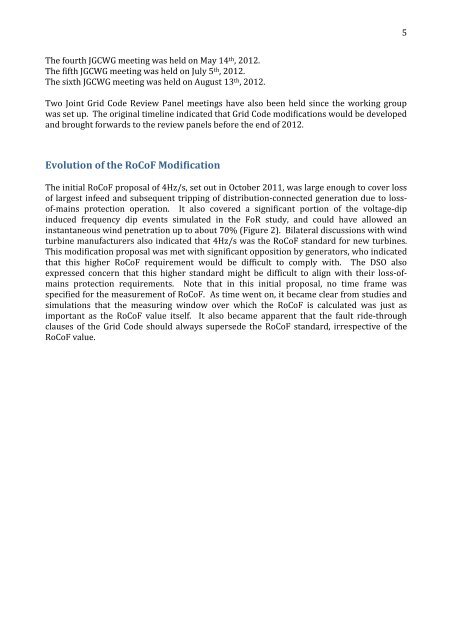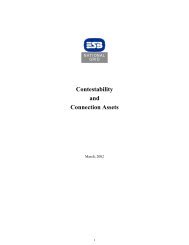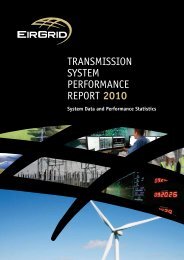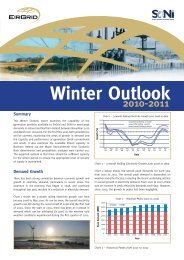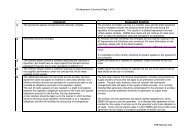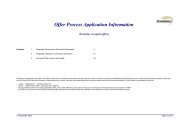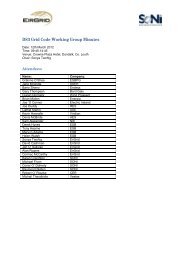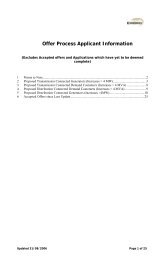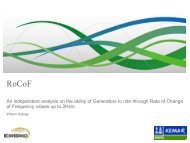4It needs to be made clear that the proposed Grid Code modifications on <strong>RoCoF</strong> are seeking acapability from generators and windfarms connected to either the transmission ordistribution network to ride through higher rates of change of frequency that result fromloss of generation events, whereas the DSOs need to specify a <strong>RoCoF</strong> threshold (which needsto be exceeded for a set period) that allows them to protect against generation islanding onthe distribution system(s). Thus, on the distribution system, distribution-connectedgenerators may be disconnected due to relay action as a result of high <strong>RoCoF</strong> values or as aresult of vector shifts. It is not the intention of the TSOs to dictate how loss-of-mainsprotection is implemented or what settings need to be applied – that is the DSOs role.However, the operational policies of the TSOs and the loss-of-mains protection settingsapplied by the DSOs will need to be co-ordinated as the levels of wind increase on the powersystem.ProcessFollowing the publication of the Facilitation of Renewables Study in April, 2010, EirGridformally wrote to all generators in Ireland (during Quarter 4, 2010) requesting confirmationof their technical capability with regard to <strong>RoCoF</strong>. The majority of the replies indicated thatthe generators were Grid Code compliant, but did not specify if they could withstand <strong>RoCoF</strong>values higher than 0.5Hz/s. EirGrid subsequently wrote to the generators again in early2011 seeking further information on the <strong>RoCoF</strong> capabilities of generators. The majority ofresponses did not clearly address the issue. It was decided that an alternative approach,using the Grid Code Review Panel as a forum, was required, as formal modification proposalsto the Grid Code would enable generators to formally respond on their capabilities.SONI carried out a similar exercise at the beginning of 2012. All generators that areconnected to the transmission system or have a Transmission Use of System Agreement(TUOSA) were contacted for information on their <strong>RoCoF</strong> capability. The main findings werethat that over 85% of connected wind generation use vector shift rather than <strong>RoCoF</strong>. Theresponses from conventional generators were not as comprehensive but generally statedthat the <strong>RoCoF</strong> capability would be in the region that is mentioned in the MinimumFunctional Specification (i.e. 1.5Hz/s). However, there were concerns on the effect ofincreased and more frequent high <strong>RoCoF</strong> events on the lifespan of the generators.An initial <strong>RoCoF</strong> Grid Code modification (MPID 219) was proposed at the Ireland Grid CodeReview Panel Meeting #29 on October 13, 2011. In this proposal, a change from 0.5Hz/s to4Hz/s was suggested. At this meeting, it was suggested by EirGrid that a working group beset up to allow cross-industry participation.The Joint Working Group involves participants from the TSOs, DSOs, Wind Industry andDevelopers, and Conventional Generators, as well as the Regulatory Authorities, from bothsides of the border. A terms-of-reference document was drafted, and a call for participationwas issued on January 9 th , 2012. Everyone who expressed an interest in participating wasinvited to attend.The first JGCWG meeting was held on February 13 th , 2012.The second JGCWG meeting was held on March 12 th , 2012.The third JGCWG meeting was held on April 16 th , 2012.
5The fourth JGCWG meeting was held on May 14 th , 2012.The fifth JGCWG meeting was held on July 5 th , 2012.The sixth JGCWG meeting was held on August 13 th , 2012.Two Joint Grid Code Review Panel meetings have also been held since the working groupwas set up. The original timeline indicated that Grid Code modifications would be developedand brought forwards to the review panels before the end of 2012.Evolution of the <strong>RoCoF</strong> <strong>Modification</strong>The initial <strong>RoCoF</strong> proposal of 4Hz/s, set out in October 2011, was large enough to cover lossof largest infeed and subsequent tripping of distribution-connected generation due to lossof-mainsprotection operation. It also covered a significant portion of the voltage-dipinduced frequency dip events simulated in the FoR study, and could have allowed aninstantaneous wind penetration up to about 70% (Figure 2). Bilateral discussions with windturbine manufacturers also indicated that 4Hz/s was the <strong>RoCoF</strong> standard for new turbines.This modification proposal was met with significant opposition by generators, who indicatedthat this higher <strong>RoCoF</strong> requirement would be difficult to comply with. The DSO alsoexpressed concern that this higher standard might be difficult to align with their loss-ofmainsprotection requirements. Note that in this initial proposal, no time frame wasspecified for the measurement of <strong>RoCoF</strong>. As time went on, it became clear from studies andsimulations that the measuring window over which the <strong>RoCoF</strong> is calculated was just asimportant as the <strong>RoCoF</strong> value itself. It also became apparent that the fault ride-throughclauses of the Grid Code should always supersede the <strong>RoCoF</strong> standard, irrespective of the<strong>RoCoF</strong> value.


